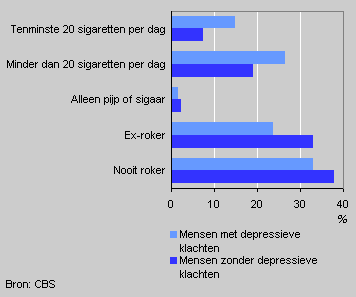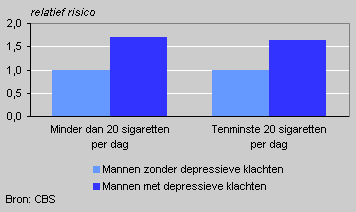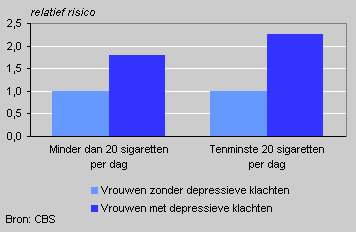More smokers among people with depression

People suffering from depression smoke significantly more often than people without such complaints. This result is shown in a survey on the relationship between depression and smoking in 2001/2002.
Depression and smoking, 2001/2002

Four in ten depressed people smoke
One person in ten indicated they suffer from depression. Over four in ten of the people with such complaints smoke. The share of smokers among people without depression was three in ten.
Difficult to stop smoking
Depressed people not only smoke more often, they also have more problems giving up smoking than people who do not suffer from depression.
A quarter of depressed people are ex-smokers, versus one third of people who do not suffer from depression.
Moderate and heavy smokers
Over one quarter of depressed people smoked fewer than twenty cigarettes a day. Among non-depressed people the share of these moderate smokers was 19 percent.
The difference between the two groups becomes greater for heavy smokers. The share of people smoking more than 20 cigarettes a day was twice as large among people suffering from depression than among people without these complaints.
Depressed women and the probability of heavy smoking
Taking into account the differences in education and age the probability of depressed men being heavy smokers was 1.5 times that of non-depressed men.
Smoking among depressed men, 2001/2002

Likewise one and a half times as many depressed women as non-depressed women are likely to smoke. The risk of depressed women being a heavy smoker, however, was twice as high.
Smoking among depressed women, 2001/2002

Smoking as self-medication
The literature indicates that depression is a cause of smoking. One explanation is that smoking is used as medication to relieve sombre feelings.
Another explanation is that depressed people often feel that life is meaningless. Such feelings lower the threshold of dangerous behaviour such as smoking.
Ferdy Otten